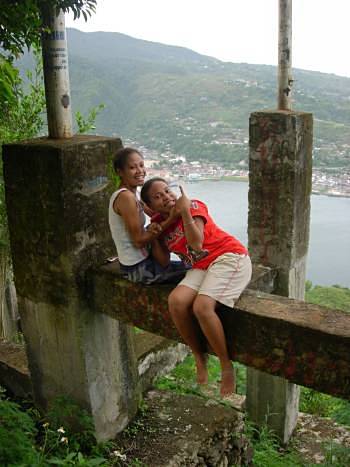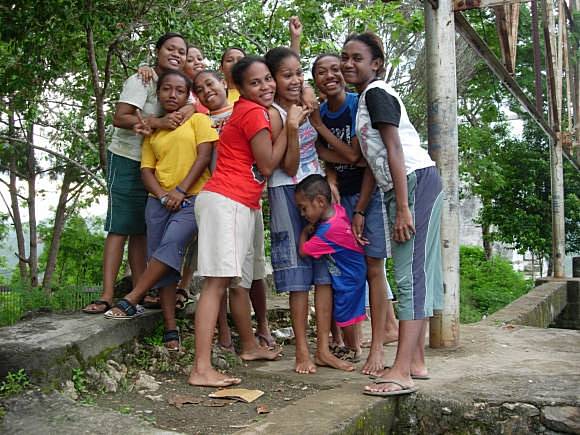New norms about love and marriage alter the rules for the young
In Papua, girls like my 17 year-old friend Janet would once have expected to have their marriages arranged by their parents and family. However, things have changed in Papuan society over recent decades, and love and marriage are no exceptions. This is not to say material considerations no longer play a part in selecting a spouse, nor that romantic love was in the past unknown in Papua. But young Papuans such as Janet now expect to form their own marriages based on love, or at least on attraction, in a way that did not happen before.
In some areas, such as the highland town of Wamena, the demand to choose one’s own partner is still very new. In others, such as Manokwari in the Bird’s Head region, love-marriage is already regarded as ‘traditional’. The impact of this ‘modern love’ is most keenly felt in larger Papuan towns, where beauty salons increasingly hire out white wedding gowns to Papuan brides to wear to their Victorian-style white weddings. The sale of love magic on the streets of urban centres also responds to the new interest in romance, even though it is a duplicitous way to make someone fall in love.
Learning to love
The importance of Christianity in the lives, worldviews and relationships of most Papuans cannot be overstated. Most Papuans see love-made marriage as an integral part of being Christian. They may or may not love more than one wife, and they may or may not take other traditional perspectives on marriage, but the linking of love and marriage is remarkably similar across Papua.
A less documented but powerful influence that is changing Papuan attitudes towards love is the media: television shows, movies, karaoke clips and magazine articles. Romantic themes are central to many media productions and are consistently used in advertising, which uses the pleasure and satisfaction that love promises to promote the consumption of commodities. Papuans today enjoy Indian and western films, Javanese and Mexican soap operas, and Ambonese or Papuan karaoke clips. Their different aesthetics give Papuans new ways of relating and feeling. And even in the remotest villages, magazines with articles about ‘how to rekindle romance’ circulate.
Confronting tradition

The impact of the media couldn’t be clearer in how young Papuans talk about love. As my friend Janet told me, ‘When I like someone I let them know by giving them a card on Valentine’s Day. If they send one back I am overjoyed, you know like that girl in the film Titanic.’ But when young Papuans like Janet pursue romance, they come face to face with the dominant conservative sexual ethos in Papua. It may be modern and Christian to marry for love, but the process of building intimacy with a potential spouse reeks of sexual immorality. As a result, getting to know a member of the opposite sex is a dangerous process that leaves people vulnerable to gossip and other punishments.
Across Papua, the institutions of church and state are united in their message that the only good sex is sex within marriage. This ideology of ‘saving yourself’ dovetails with the message sent by adat (customary) leaders that the obedience and chastity of Papuan youth is a foundation of ethnic integrity. Young people who transgress these sexual boundaries risk being subjected to traditional retributive justice. For most of Papua, adat is synonymous with the bride-price economy, where ‘free’ sex is most definitely bad management practice. In a nutshell, bride-price assumes that female sexuality and reproductivity are clan-based resources, not individual ones. When a man’s family pays bride-price, the rights to his wife’s reproductivity are transferred to him. The offspring of their union are incorporated into his clan. In theory, at least, any sexual activity outside these relationships amounts to a kind of theft, deserving of compensation.
Secret affairs
In practice, cunning and luck are more likely to determine the fate of illicit sexual relations than any set of rules. But given the anxiety around pre-marital sex, the only socially legitimate form of courtship remains that which is public, sexless, and morphs hastily into marriage. The ideal partner is of a similar age to you, is Christian, and has graduated from high school or university. He should have a job or, at least be industrious. As these ideals are impossibly high for many Papuans, ‘suka sama suka’ (mutual attraction) relationships are frequently formed in secret. But these kinds of liaisons are definitely dangerous, especially for women.
…the only socially legitimate form of courtship is that which is public, sexless, and morphs hastily into marriage
Affairs are usually exposed through pregnancy, and the implications of a ‘shotgun wedding’ are very much alive in Papua. In adat courts, the ideal outcome is usually to see the girl wed and the man accused pay a fine as well as bridewealth. But a daughter’s untimely pregnancy can be economically disadvantageous for her and her family in two ways. Firstly, her more desperate status lowers her bargaining position in bridewealth negotiations. Secondly, pregnancy is likely to force her to leave school, which damages her chances of finding secure work and future economic security.
In Manokwari at least, when young women contemplate having a secret affair, their greatest fear is not that they will be labelled a sinner. Nor do they tend to fear sabotaging their economic security by falling pregnant, or becoming infected with HIV. Rather, the greatest fear associated with hiding romantic relationships is that, if exposed, great shame will fall upon their parents.
Heartache either way
For many couples whose union would not be approved because one or both spouses do not meet family standards, ‘shotgun weddings’ work in their favour. Yet even if the couple start their marriage in love, the pressures of living with the husband’s family – which a combination of poverty and tradition makes a common practice in Papua – can erode newlyweds’ amorous feelings. I have met many unhappy households where an unchosen daughter-in-law is said to have brought disharmony to the household due to her ill-temper or laziness.
On the girl’s part, moving into an unsupportive household can affect her well-being, especially if that household is far away from her own family. The norm of following a husband (ikut suami) refers not only to his family home but also to his religion. When attraction leads a Christian woman to marry a Muslim, or even a man from another Christian denomination, it can cause considerable emotional pain since it typically means she will depart from the family church, an institution which is central to the identity and spiritual passion of most Papuans. This outcome creates great rupture within a family.
Marriages contracted by the spouses themselves can also lead to other heartaches that were less likely in a time when kin arranged marriages. Women traditionally move to their spouses’ villages, but in the past this rarely meant going far away. Now they choose their spouses from a pool that includes men from other parts of Indonesia, and even further afield. As a result, distance can make it harder than ever for wives to maintain relationships with their families of origin.
Like women everywhere, Papuan women face the possibility that a charming boyfriend can become a nightmare husband. When women hold out hope for more egalitarian and respectful relationships, the revelation that lovers are in fact liabilities, spending the family income on gambling, sex workers and alcohol, only intensifies their disappointment.
Young Papuans such as Janet now expect to form their own marriages based on love
Emotional transformations taking place in Papua are as dramatic as any in the socio-political and cultural realms. New understandings of love, new expectations of gender relations and new experiences of romantic passion have inevitably accompanied the more documented changes associated with modernisation. For my friend Janet and her peers, pressure to conform to highly conservative moral expectations, as espoused by representatives of church, state and adat, all too often clash with youthful desires for romantic adventure and intimacy. And even when young women negotiate this cultural clash and successfully wed their beloved, new obstacles arising from economic hardship can conspire to dash their hopes of living happily ever after. ii
Sarah Hewat (sarah_hewat@iprimus.com.au) is a PhD student at Melbourne University. She is writing a thesis on romantic courtship amongst Papuan youth in Manokwari.












